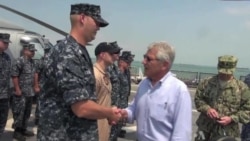SINGAPORE —
U.S. Defense Secretary Chuck Hagel has wrapped up a visit to Asia, where he attended the Shangri-La security summit in Singapore. Hagel sought to reassure allies the United States remains committed to security in the region. The defense secretary also offered reassurances to China.
Chuck Hagel launched his first trip to Asia as secretary of defense from Hawaii, telling troops of the U.S. Pacific Command the toughest battle ahead is in cyberspace.
“This is a very difficult, but real and dangerous threat. And there is no higher priority for our country," he said.
Arriving at the Shangri-La security summit in Singapore, Hagel wasted no time in naming the source of much of that threat.
"The United States has expressed our concerns about the growing threat of cyber intrusions, some of which appear to be tied to the Chinese government and military," he said.
Hagel's main objective in Singapore was to reassure Asia-Pacific partners including Japan and South Korea that the administration's strategy of rebalancing to the Pacific remains on track, despite Washington's budget troubles.
The Pentagon is proceeding with plans to shift 60 percent of its naval assets to the Pacific. Hagel on Sunday visited sailors aboard the combat ship USS Freedom, now deployed in Singapore.
The rebalance has sparked questions from the Chinese, who perceive the strategy as a U.S. attempt to contain China's growing influence in the Asia-Pacific.
Through greater, more visible engagement, Hagel brought the message the United States welcomes a strong and emerging China, one that will be a responsible partner that will contribute to security in this region.
Chuck Hagel launched his first trip to Asia as secretary of defense from Hawaii, telling troops of the U.S. Pacific Command the toughest battle ahead is in cyberspace.
“This is a very difficult, but real and dangerous threat. And there is no higher priority for our country," he said.
Arriving at the Shangri-La security summit in Singapore, Hagel wasted no time in naming the source of much of that threat.
"The United States has expressed our concerns about the growing threat of cyber intrusions, some of which appear to be tied to the Chinese government and military," he said.
Hagel's main objective in Singapore was to reassure Asia-Pacific partners including Japan and South Korea that the administration's strategy of rebalancing to the Pacific remains on track, despite Washington's budget troubles.
The Pentagon is proceeding with plans to shift 60 percent of its naval assets to the Pacific. Hagel on Sunday visited sailors aboard the combat ship USS Freedom, now deployed in Singapore.
The rebalance has sparked questions from the Chinese, who perceive the strategy as a U.S. attempt to contain China's growing influence in the Asia-Pacific.
Through greater, more visible engagement, Hagel brought the message the United States welcomes a strong and emerging China, one that will be a responsible partner that will contribute to security in this region.





